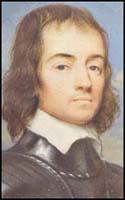Robert Lilburne

Robert Lilburne, the brother of John Lilburne, was born in 1613. was born in Thickley Puncherdon, in 1615. His father, Richard Lilburne, owned land in Durham. His mother, Margaret Lilburne, was the daughter of Thomas Hixon, the yeoman of the wardrobe to Elizabeth I.
On the outbreak of the Civil War Lilburne joined the Parliamentary forces. He served under Edward Montagu and by 1644 had reached the rank of captain. He later joined the New Model Army and in 1647 was promoted to the rank of colonel.
A supporter of the Levellers, Lilburne's regiment took part in the Corkbush Field in November 1647. He was sent for by the House of Commons where he was questioned about his conduct. Soon afterwards General Thomas Fairfax appointed Lilburne as Governor of Newcastle.
In December 1648, Lilburne was nominated as one of the judges in the trial of Charles I. He attended the proceedings and signed the king's death warrant.
Lilburne served under Oliver Cromwell during his Scottish campaigns. Left in charge of Lancashire he defeated the Earl of Derby near Wigan on 25th August, 1651. Cromwell praised Lilburne's services to the House of Commons and he was granted land in Scotland worth £300 a year.
Some officers complained that Lilburne was too sympathetic to the Anabaptists and the Levellers in the army. However, he still had the support of Cromwell and in 1655 he was given command of the army against the royalist insurrection in York.
In 1656 Lilburne was elected to the House of Commons where he represented the East Riding of Yorkshire. He also served as Governor of York.
Oliver Cromwell died on 3rd September 1658. His son, Richard Cromwell, became Lord Protector but in May 1659, the generals forced him to retire from government. Parliament and the leaders of the army now began arguing amongst themselves about how England should be ruled. General George Monck, the officer in charge of the English army based in Scotland, decided to take action, and in 1659 he marched on London.
When Monck arrived he reinstated the House of Lords and the Parliament of 1640. Royalists were now in control of Parliament. Monck now contacted Charles II, who was living in Holland. Charles agreed that if he was made king he would pardon all members of the parliamentary army and would continue with the Commonwealth's policy of religious toleration.
Lilburne and John Lambert attempted to arouse resistance to the restoration of the monarchy. He marched against George Monck in November 1659 but his army deserted and he was forced to surrender York.
On the Restoration Lilburne, like other Regicides, was arrested. On 16th October, 1660, Lilburne was sentenced to death, but later this was commuted to life imprisonment. Robert Lilburne died in prison in August, 1665.
